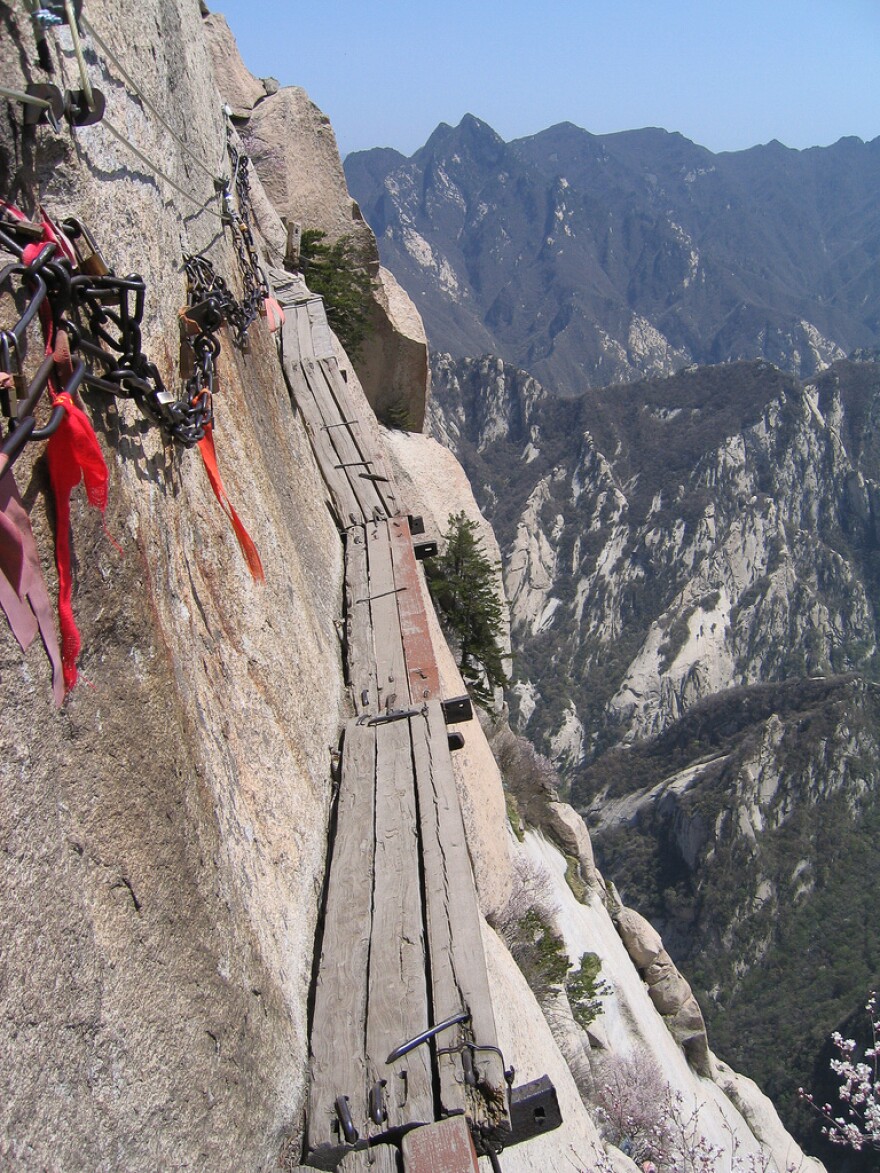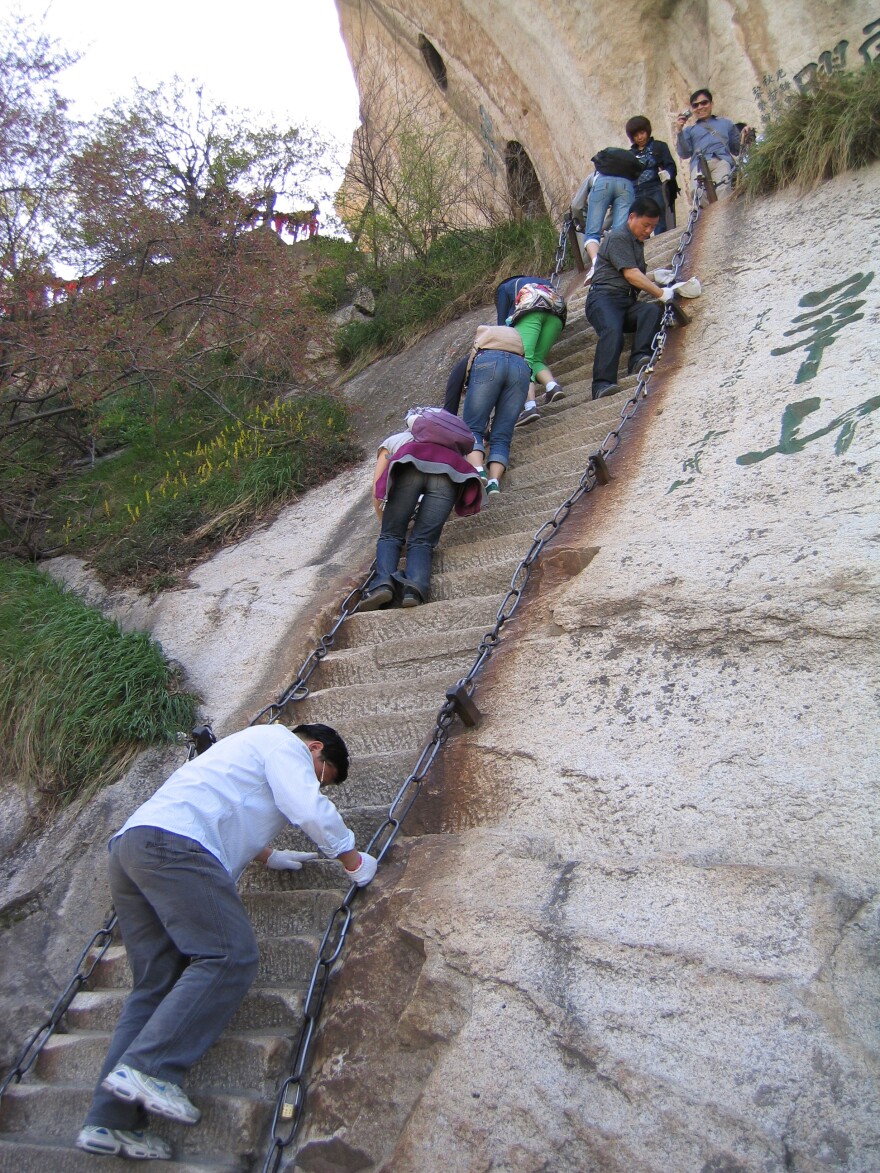Imagine yourself clinging to a cliff face with nothing but uneven, worn wooden planks and chains to keep you from plummeting 7,000 feet to your untimely demise. Don't worry: You can rent a little red safety harness for $5. No one will make you wear it, though.

Oh, and you will probably encounter someone coming the other way, in which case you will have to maneuver around your neighbor as if playing a deadly game of Twister. Someone has to go on the outside, so I hope you're good at not blinking first.
You wouldn't do this for all the tea in China, you say?
Some people do it for just one cup.
Mount Hua (also known as Huashan) is in central China's Shaanxi Province, not far from the famed terracotta soldiers. Though a popular destination for thrill-seeking tourists, the mountain has been steeped in religious history since a Taoist temple was first built at its base in the second century B.C.
The plank-walk, sometimes called "the most dangerous trail in the world," is a detour along the path to a pot of tea at a Taoist temple called Cuiyun Palace. That's fitting because the "Tao," which translates as "the path" or "the way," will always lead you to tea.
Taoism is China's indigenous spirituality, dating back to the fourth century B.C., when Laozi, the reputed author of the Tao Te Ching, was said to have been served the first cup of ceremonial tea.

Taoists seek harmony with nature — not only outer nature, but also inner.
"Tea is part of that integrated path of well-being," says Ken Cohen, 62, a Taoist scholar and tea master. "It is deeply linked with the Taoist search for health, for longevity, spiritual wisdom and health benefits now validated by Western medical science."
Taoism seeks to organize the body and mind to "nurture life," an art called "Yang Sheng." It means to "adjust your lifestyle habits, such as meditation, physical environment, the food you eat, exercise habits — how you can create a holistic system for well-being," Cohen says. "Through these habits, one becomes aligned with nature, and those who are deeply in touch with themselves will naturally express ethics and morality."

Meditation is vital to reach this state, and tea is at the center of it. Drinking it with a quiet mind and awareness allows the senses to open — to stop, look and listen. In his book The Art and Alchemy of Chinese Tea, Daniel Reid writes that the true taste of tea reveals itself only to those who learn how to relax their bodies and still their minds.
The Chinese don't use the term "tea ceremony" in a way that involves religious symbolism and an exact choreography. Rather, they use the phrase "Cha Yi," or "the art of tea." The practice is more flexible, with general rules aimed at creating an aesthetic experience in which the mind, body and spirit are all involved and focused.
"The purpose of the ceremony is to find how you can maximize your experience, from what kind of utensils you use, to how you prepare the water, to the amount of tea you put in the cup," says Cohen. "The only rules are those that are necessary to bring out the flavor of the tea."
On Mount Hua, the water is pristine. It comes from snowmelt, rain and mountain springs. Sometimes porters carry bottled water to the summit. A porter, whose age generally ranges from 30 to 60, navigates the treacherous trails while carrying up to 175 pounds of construction materials, food, water and rubbish on his back, says James Guo, who has lived in the area for nearly 40 years and who leads tours through the mountains. But better-maintained trails, wider paths, railings and a cable car that goes halfway up the mountain have made the climb more accessible to tourists — and has taken some of the strain off porters, he says.
Most tourists come to scale the precipitous peaks and take in the views. But that hasn't abated Mount Hua's religious significance. Its five peaks create the shape of a lotus flower, revered by Taoists for its wisdom and openness. The mountains, which were a place for pilgrimage for emperors of past dynasties, are still dotted with several influential temples. Mount Hua is one of the five sacred mountains in China, and it is the site of many legends involving deities and immortality.
The influx of tourism also hasn't diminished tea's importance and life-giving properties, Cohen contends.
"When you have a Taoist monastery, or a place of meditation like Mount Hua, or a place where they're simply serving tea in an area that is appreciative of Taoism and Chinese art, the very fact that they're serving it in healing and meditative intent changes the effect on the people who drink it," he says, citing a 2013 study in the journal Explore.
That in itself may well be worth the climb.
Tea Tuesdays is an occasional series exploring the science, history, culture and economics of this ancient brewed beverage.
Laurel Dalrymple is a writer based in Northern Virginia.
Copyright 2020 NPR. To see more, visit https://www.npr.org. 9(MDAwMzY5MzE4MDEzMTE3ODg5NDA4ZjRiNg004))


